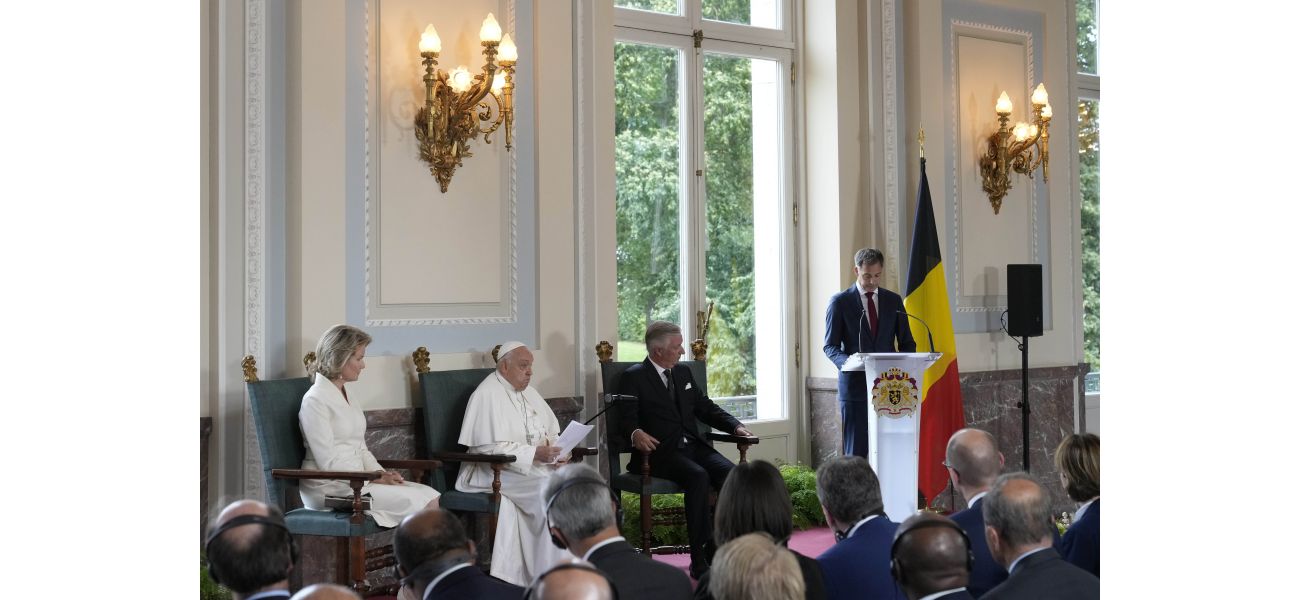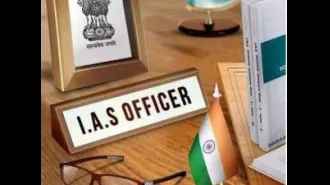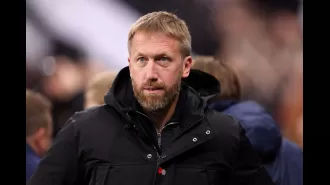Belgian leader and monarch confront Pope Francis about church's concealment of sexual abuse.
Belgian PM confronts Pope over Church's history of sexual abuse, demands transparency and accountability.
September 27th 2024.

On Friday, Belgium's prime minister, Alexander De Croo, delivered a powerful speech to Pope Francis, criticizing the Catholic Church's handling of clerical sex abuse and cover-ups in their country. He demanded concrete actions to address the past and prioritize the needs of victims over those of the church. This speech, given at the start of the pope's visit, was one of the most direct and pointed remarks ever made to a pope during a foreign trip. Even King Philippe joined in, calling on the church to take continuous action to atone for their crimes and help victims heal.
The tone of the speeches highlighted the ongoing severity of the abuse scandal in Belgium. For the past twenty years, revelations of abuse and systematic cover-ups have deeply damaged the church's reputation and led to a decline in Catholicism and the church's influence. Pope Francis, who was applauded at the end of De Croo's speech, was expected to meet with victims in private later that day. In an improvised response, he expressed shame and humiliation, acknowledging that words alone were not enough and that concrete steps needed to be taken.
De Croo's speech, delivered to an audience of royals, church officials, diplomats, and politicians at Laeken Castle, emphasized the importance of listening to victims, recognizing their suffering, and holding those responsible accountable. He emphasized the need for transparency and an end to cover-ups, stating that for the church to move forward, it must come clean about its past.
The victims, overall, welcomed the strong words from both the prime minister and the king. One survivor, Emmanuel Henckens, expressed that they had touched on the heart of the issue and that it was no longer possible to ignore the abuse. Another survivor, Koen Van Sumere, stressed the need for the church to go beyond apologies and provide substantial reparations to the victims. He pointed out that the Belgian church's current payments were meager and did not cover the costs of therapy.
The abuse scandal in Belgium has been ongoing for over twenty-five years, with new revelations emerging over time. In 2010, the country's longest-serving bishop, Bruges Bishop Roger Vangheluwe, was allowed to resign without punishment after admitting to sexually abusing his nephew for thirteen years. It wasn't until this year that Pope Francis defrocked him, in an effort to address the ongoing outrage among Belgians before his visit.
In 2010, Belgian police conducted raids on church offices, the home of a retired archbishop, and even a prelate's crypt, which was condemned by the Vatican as deplorable. In the same year, a 200-page report was released, revealing that 507 people had come forward with stories of abuse by priests, some as young as two years old. The report also identified at least 13 suicides and six attempted suicides by victims. However, victims and advocates believe that these numbers are just the tip of the iceberg, and the true scope of the scandal is much greater. Hopes for criminal investigations were dashed when the police returned the seized documentation to the church.
Last year, a Flemish documentary aired, sharing the stories of Belgian victims and exposing the extent of the abuse and cover-ups by the Catholic hierarchy. For the first time, victims spoke out on camera, revealing the depravity of the crimes and the systematic cover-up. It was significant that both King Philippe and De Croo delivered their strongest remarks about the abuse in Dutch, the language spoken in the predominantly Catholic Flanders region, where many abuse cases have been reported.
De Croo's speech was also a departure from Vatican protocol, as typically only the king addresses the pope. However, as in Canada, where Prime Minister Justin Trudeau also spoke alongside the governor-general, De Croo's office requested to address the pope. In his remarks, Pope Francis acknowledged the abuse, stating that the church is addressing the issue through prevention programs and supporting victims in their healing journey.
Despite the strong words from the prime minister and the king, Pope Francis went off-script to express the church's shame for the scandal and his commitment to ending it. He acknowledged that the church must ask for forgiveness and take responsibility for their actions. However, victims are calling for more than just words and apologies. They want the church to implement robust reparations programs to compensate for the trauma and provide funding for necessary therapy. Some have even written a letter to Pope Francis, outlining their demands, which they planned to deliver during their private meeting.
The pope, king, and prime minister also addressed a recent scandal in Belgium regarding forced adoptions, which was similar to the revelations in Ireland's mother and baby homes. Between World War II and the 1980s, many single mothers were forced to give up their babies for adoption by the Belgian church. The records have long been lost, making it nearly impossible for adoptees to find their birth mothers. Pope Francis expressed sadness at learning about these practices but noted that they were unfortunately prevalent in society at the time. He previously issued an apology on behalf of the church to survivors of Ireland's forced adoptions, a topic he is familiar with due to Argentina's own history of forced adoptions during the military dictatorship in the 1970s.
The tone of the speeches highlighted the ongoing severity of the abuse scandal in Belgium. For the past twenty years, revelations of abuse and systematic cover-ups have deeply damaged the church's reputation and led to a decline in Catholicism and the church's influence. Pope Francis, who was applauded at the end of De Croo's speech, was expected to meet with victims in private later that day. In an improvised response, he expressed shame and humiliation, acknowledging that words alone were not enough and that concrete steps needed to be taken.
De Croo's speech, delivered to an audience of royals, church officials, diplomats, and politicians at Laeken Castle, emphasized the importance of listening to victims, recognizing their suffering, and holding those responsible accountable. He emphasized the need for transparency and an end to cover-ups, stating that for the church to move forward, it must come clean about its past.
The victims, overall, welcomed the strong words from both the prime minister and the king. One survivor, Emmanuel Henckens, expressed that they had touched on the heart of the issue and that it was no longer possible to ignore the abuse. Another survivor, Koen Van Sumere, stressed the need for the church to go beyond apologies and provide substantial reparations to the victims. He pointed out that the Belgian church's current payments were meager and did not cover the costs of therapy.
The abuse scandal in Belgium has been ongoing for over twenty-five years, with new revelations emerging over time. In 2010, the country's longest-serving bishop, Bruges Bishop Roger Vangheluwe, was allowed to resign without punishment after admitting to sexually abusing his nephew for thirteen years. It wasn't until this year that Pope Francis defrocked him, in an effort to address the ongoing outrage among Belgians before his visit.
In 2010, Belgian police conducted raids on church offices, the home of a retired archbishop, and even a prelate's crypt, which was condemned by the Vatican as deplorable. In the same year, a 200-page report was released, revealing that 507 people had come forward with stories of abuse by priests, some as young as two years old. The report also identified at least 13 suicides and six attempted suicides by victims. However, victims and advocates believe that these numbers are just the tip of the iceberg, and the true scope of the scandal is much greater. Hopes for criminal investigations were dashed when the police returned the seized documentation to the church.
Last year, a Flemish documentary aired, sharing the stories of Belgian victims and exposing the extent of the abuse and cover-ups by the Catholic hierarchy. For the first time, victims spoke out on camera, revealing the depravity of the crimes and the systematic cover-up. It was significant that both King Philippe and De Croo delivered their strongest remarks about the abuse in Dutch, the language spoken in the predominantly Catholic Flanders region, where many abuse cases have been reported.
De Croo's speech was also a departure from Vatican protocol, as typically only the king addresses the pope. However, as in Canada, where Prime Minister Justin Trudeau also spoke alongside the governor-general, De Croo's office requested to address the pope. In his remarks, Pope Francis acknowledged the abuse, stating that the church is addressing the issue through prevention programs and supporting victims in their healing journey.
Despite the strong words from the prime minister and the king, Pope Francis went off-script to express the church's shame for the scandal and his commitment to ending it. He acknowledged that the church must ask for forgiveness and take responsibility for their actions. However, victims are calling for more than just words and apologies. They want the church to implement robust reparations programs to compensate for the trauma and provide funding for necessary therapy. Some have even written a letter to Pope Francis, outlining their demands, which they planned to deliver during their private meeting.
The pope, king, and prime minister also addressed a recent scandal in Belgium regarding forced adoptions, which was similar to the revelations in Ireland's mother and baby homes. Between World War II and the 1980s, many single mothers were forced to give up their babies for adoption by the Belgian church. The records have long been lost, making it nearly impossible for adoptees to find their birth mothers. Pope Francis expressed sadness at learning about these practices but noted that they were unfortunately prevalent in society at the time. He previously issued an apology on behalf of the church to survivors of Ireland's forced adoptions, a topic he is familiar with due to Argentina's own history of forced adoptions during the military dictatorship in the 1970s.
[This article has been trending online recently and has been generated with AI. Your feed is customized.]
[Generative AI is experimental.]
0
0
Submit Comment




